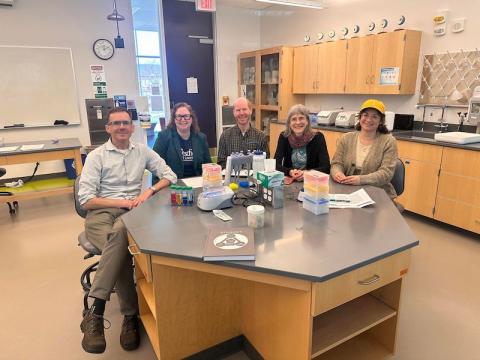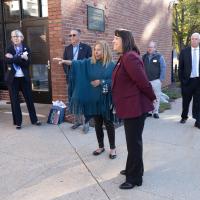
Westfield State University Receives STEM-ACT Grant to Enhance Educator Preparation

From left to right: Dr. Arne Christensen, Dr. Megan Kennedy, Dr. Volker Ecke, Dr. Christine Von Renesse, and Dr. Shannon Gleason.
Westfield State University has recently been awarded the prestigious Robert Noyce Grant from the National Science Foundation, signaling a significant step forward in the university's efforts to enhance the preparation of future and current educators in the STEM (science, technology, engineering, and mathematics) field. This grant, in collaboration with high-need public schools in Springfield and Holyoke, awards 1.2 million dollars to the University and is designed to deepen relationships between each school and foster a greater understanding of the critical need for more educators trained in inclusivity within the STEM field.
Dr. Arne Christensen, Associate Professor of Biology at Westfield State University, highlighted the distinction between the recently awarded S-STEM scholarship and the STEM-ACT grant. While the S-STEM scholarship targets academically talented, low-income students interested in pursuing STEM careers, the STEM-ACT grant focuses on the importance of diversity in future STEM secondary education educators. “The programs are similar in that they support STEM students for sure,” he added. “It’s a different angle, and so this is an opportunity for the two programs to work together and synergize.”
Dr. Megan Kennedy, Executive Director of Educator Preparation, Accreditation, and Outreach at the University elaborated on the collaborative efforts involved in the STEM-ACT grant. “We’re working closely with community partners,” she said. “We can build pipelines that could support these efforts. A key component of this is recognizing that our schools need high-quality educators out there for the future.”
To qualify for the STEM-ACT grant, students must commit to teaching for two years in high-need districts in Massachusetts for each year of scholarship support. The grant provides $12,000 scholarships annually for recipients' junior and senior years.
Dr. Volker Ecke, Associate Professor of Mathematics at Westfield State University, emphasized the collaborative learning opportunities that the STEM-ACT grant offers. “I’m here to educate future teachers,” he said. “I haven’t taught in these districts yet, so I realized that I needed to learn more. The unique feature of this STEM-ACT grant is in recognizing that different partners have different expertise. So, this includes collaborating and co-teaching with teachers in these school districts. The larger Community of Practice we are creating includes us, and the future teachers as well. It’s a learning opportunity across the board.”
“I think this aligns with our social justice orientation, and non-hierarchical approach,” Dr. Shannon Gleason, Assistant Professor of Education, added. “We’re saying ‘yes, we have this expertise’, but we also see the teachers and scholars as experts in their own experience as well.”
Dr. Christine Von Renesse, Professor of Mathematics, also elaborated on their efforts. “We talked with the high-need school districts in our area to identify their needs, and it seems like their need is more subject matter knowledge while our need is connecting with these students. I’m very excited about the co-teaching and about the community of practice to really learn the other part. We made sure to talk to everybody involved so that we are not creating a story about what other people need. We hear from them what they need, and then try to figure out how that fits.”
Kennedy reiterated how drastically the education field has changed while designing this program and agreed with Gleason’s emphasis on the importance of teaching as a social justice act that gives back to communities. Gleason clarified, “Nationally, there’s a shortage of highly qualified STEM teachers, but especially in high-needs districts. We’re anticipating that providing students with a stronger background in culturally sustaining practices, and social justice will help to increase retention as teachers in high-need districts.”
The STEM-ACT grant represents a major investment in Westfield State University's commitment to excellence in STEM educator preparation. With a focus on collaboration and community engagement, the grant is poised to make a lasting impact on the future of STEM education in Massachusetts and beyond.


